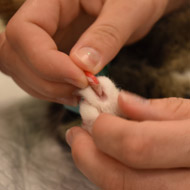
Charity concerned covers could be doing more harm than good
A UK charity has warned pet owners not to copy the ‘worrying’ new trend for brightly coloured claw covers.
Battersea Dogs and Cats Home says that the growing movement on social media for matching ‘manicures’ could be doing more harm than good.
Claw covers are vinyl nail caps that are glued onto the existing claws. For cats, this means that they cannot fully retract their claws, preventing them from displaying their natural behaviour.
Battersea was first made aware of the trend when a cat was presented to their London rescue centre wearing red claw covers. Vets immediately made the decision to remove the covers while the cat was under anaesthetic. The cat has since been rehomed.
“This is the first time we’ve seen a cat come in with claw covers and we’re concerned that this craze is becoming increasingly popular with pet owners,” said Battersea’s head of catteries, Lindsey Quinlan.
“It’s extremely cruel to inflict this sort of thing on your cat as it stops them from displaying their natural behaviour.”
She continued: “It’s worrying that claw covers for both cats and dogs can be so easily sought from the internet. Pets are not fashion items. We want to spread the message that claw covers are unnatural for both cats and dogs.”
Battersea are also concerned that some pet owners may be purchasing claw covers to prevent their pet from scratching furniture.
“Anyone thinking about rehoming a cat needs to think carefully about what this means and realise that scratching is part and parcel of owning a cat,” said Lindsey.
Image (C) Battersea Dogs and Cats Home



 The latest
The latest